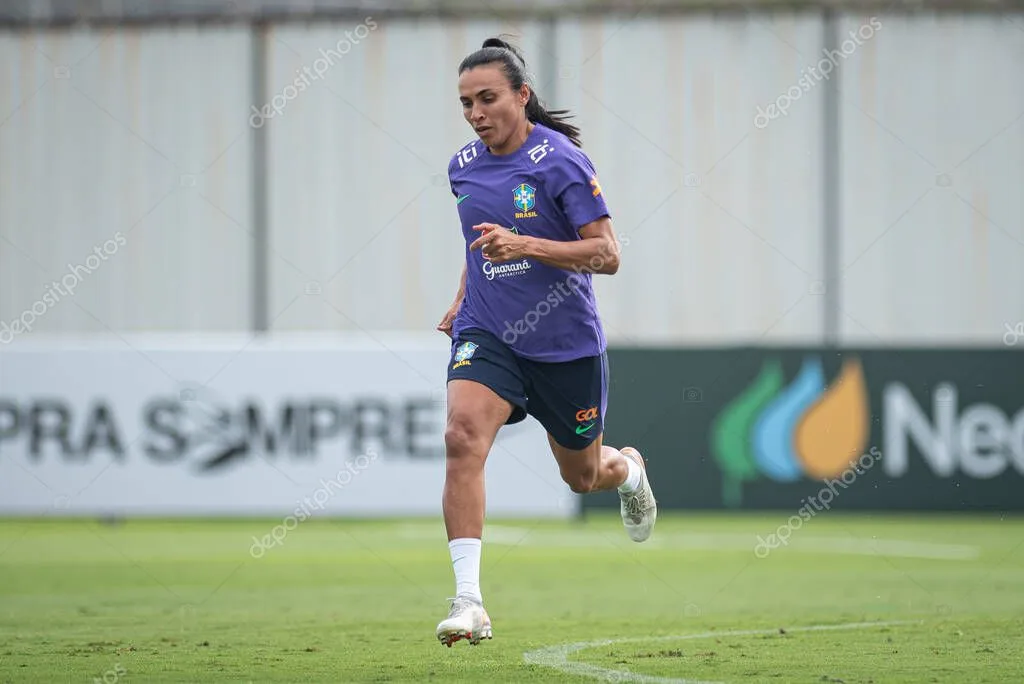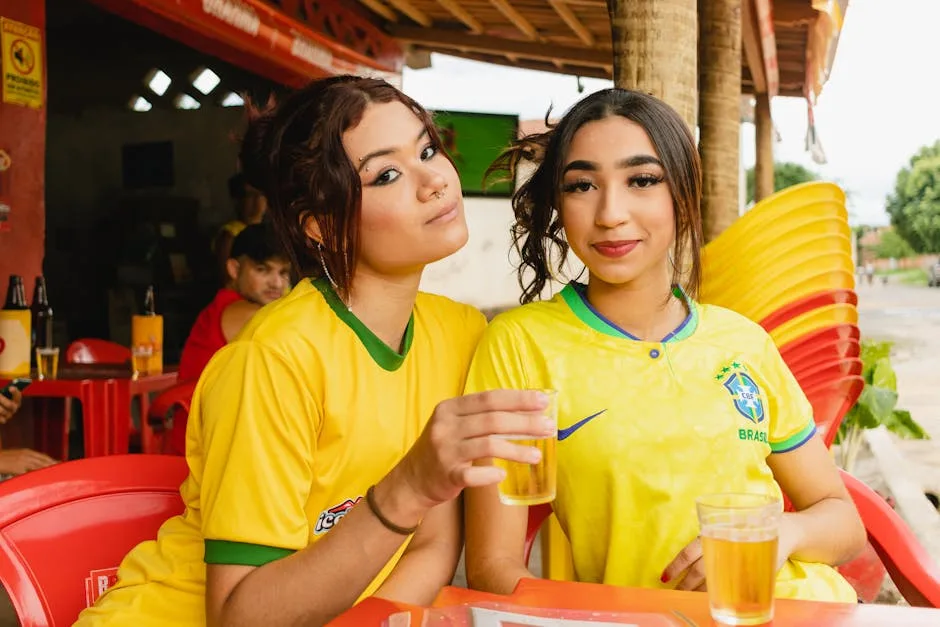- The Heartbeat of a Nation, A Story Half-Told
- A Game Outlawed: The Decades of Silence
- Enter the Queen: Marta’s Unparalleled Reign
- The Tides are Turning: A New Era of Growth
- The Brasileirão Feminino: A League on the Rise
- Nurturing the Roots for Future Growth
- The Hurdles Ahead: A Fight Far From Over
- More Than a Game: The Broader Social Impact
The Heartbeat of a Nation, A Story Half-Told
When you think of brazil, what comes to mind? Is it the vibrant energy of carnival, the sweeping vistas of the Amazon, or the rhythm of samba? For millions around the globe, the answer is simple: football. Brazil is the País do Futebol, the country of football. It’s a place where the game is less a sport and more a religion, a language understood from the beaches of Rio to the bustling streets of São Paulo. We all know the legends—Pelé, Ronaldo, Ronaldinho, Neymar. Their names are woven into the fabric of global sports history. But that’s only half the story.
For decades, the other half of this story, the women’s story, was whispered, ignored, or actively suppressed. It’s a tale of resilience, passion, and a fight for the simple right to play. It’s a story personified by one of the greatest players to ever grace a pitch, Marta Vieira da Silva. But her incredible journey is the pinnacle of a much larger movement. Let’s dive into the powerful, complicated, and inspiring world of women’s football in Brazil—its painful past, its vibrant present, and the challenges that still lie ahead.
A Game Outlawed: The Decades of Silence
It’s a piece of history so shocking it feels unbelievable. In 1941, under the government of Getúlio Vargas, Brazil passed a decree that legally banned women from participating in sports considered “incompatible with the conditions of their nature.” Football, the nation’s greatest passion, was at the top of that list. For nearly 40 years, until the ban was officially lifted in 1979, it was illegal for women in Brazil to form teams, play in organized leagues, or even just kick a ball around in a serious way. An entire generation of potential stars never got the chance to shine.
Think about the profound impact of that. While the men’s national team was winning World Cups in 1958, 1962, and 1970, and building its global dynasty, the women were relegated to the sidelines by law. This wasn’t just a lack of support; it was a state-sanctioned erasure. When the ban was finally lifted, women’s football didn’t just magically appear. It had to be rebuilt from scratch, with no infrastructure, no funding, and a mountain of social prejudice to overcome. The pioneers of the 80s and 90s played on poor fields, for little to no pay, fueled by nothing more than a stubborn love for the game.
Enter the Queen: Marta’s Unparalleled Reign
Out of this challenging environment emerged a player of such transcendent talent that she couldn’t be ignored. Marta Vieira da Silva, or simply Marta, is not just a footballer; she is a phenomenon. Born in a small town in Alagoas, her genius was evident from a young age. With a ball at her feet, she was magic—a whirlwind of skill, speed, and breathtaking creativity.

Her list of accomplishments is staggering and speaks for itself:
- Six-time FIFA World Player of the Year: More than any other player, male or female.
- All-time leading scorer in World Cup history: With 17 goals, she has scored more than any man or woman in the tournament’s history.
- Scorer in five different World Cups: A testament to her incredible longevity and consistency.
But Marta’s legacy extends far beyond statistics. She became the face and voice of a generation of female athletes fighting for recognition. During the 2019 World Cup, after a tough loss, she delivered an emotional, unscripted speech to the cameras that became a global rallying cry. Looking directly into the lens, tears in her eyes, she spoke to the young girls back in Brazil. “Cry in the beginning so you can smile in the end,” she pleaded. “There’s not going to be a Formiga forever, there’s not going to be a Marta forever, there’s not going to be a Cristiane. The women’s game depends on you to survive.” It was a watershed moment, a powerful call to action that resonated deeply in Brazil and beyond.
The Tides are Turning: A New Era of Growth
Thankfully, the landscape Marta and her predecessors fought so hard to change is finally, genuinely, shifting. The last decade has seen more progress for women’s football in Brazil than the previous four decades combined. A key catalyst was a 2019 mandate from CONMEBOL, South America’s football confederation, which required any men’s club wishing to compete in the prestigious Copa Libertadores to also operate and fund a professional women’s team.
This single rule change was a game-changer. Suddenly, major clubs with huge fanbases and deep pockets—like Corinthians, Palmeiras, Flamengo, and São Paulo—had to invest in the women’s game. This led to:
- Increased Professionalism: Better contracts, higher salaries, and access to top-tier training facilities and medical staff.
- Media Visibility: Major broadcasters began televising the national league, the Brasileirão Feminino. Games that were once impossible to find are now accessible to millions, creating new fans and heroes.
- Growing Fanbases: Clubs are now actively marketing their women’s teams, and the fans are responding. Attendance records are being broken, and the passion once reserved only for the men’s teams is now being shared.
The Brasileirão Feminino: A League on the Rise
The Brasileirão Feminino is the heart of this new era. What was once a small, semi-pro tournament has blossomed into a highly competitive and entertaining league. The rivalry between teams like Corinthians, the dominant force in recent years, and their challengers creates compelling storylines. Players who used to have to go to Europe or the US to have a professional career can now stay and thrive in Brazil. This keeps top talent at home, strengthening the league and giving young girls local heroes to look up to beyond the national team icons.
Nurturing the Roots for Future Growth
For long-term success, the foundation must be strong. The next frontier for women’s football in Brazil is at the grassroots level. For every Marta who makes it, there are countless girls who drop out due to a lack of opportunities, unsafe environments, or family pressure to pursue more “feminine” activities. The cultural shift is happening, but it needs to be supported by tangible structures.
This means creating more youth academies specifically for girls, training more female coaches, and making football accessible and safe in communities across the country. Social projects are playing a huge role, using football as a tool for empowerment, teaching girls about teamwork, discipline, and self-confidence. The future of the Seleção Feminina, the national team, depends on this pipeline of talent. The more girls who are given a chance to play, the deeper the talent pool will be for generations to come.

The Hurdles Ahead: A Fight Far From Over
Despite the incredible progress, it would be naive to say the fight is won. Significant challenges remain, and the path to true equality is steep. The pay gap between male and female players is still astronomical. While the top female stars can make a good living, many players in the Brasileirão Feminino still earn modest salaries, especially compared to their male counterparts.
Infrastructure is another major issue. While the top clubs offer excellent facilities, many smaller clubs still struggle with subpar pitches and inadequate resources. Moreover, the battle against deep-seated sexism continues. Female players, coaches, and referees still face prejudice and disrespectful comments that their male peers do not. Securing sustainable, long-term commercial investment—from sponsors who see the inherent value in the women’s game, not just those fulfilling a mandate—is crucial for the next stage of growth.
More Than a Game: The Broader Social Impact
The rise of women’s football in Brazil is about so much more than just sports. It’s a powerful reflection of and a catalyst for broader social change. Every time a women’s match is broadcast on primetime television, it challenges outdated gender stereotypes. Every time a father takes his daughter to a Brasileirão Feminino match, it helps normalize female athleticism and ambition.
In a country still grappling with issues of gender inequality, the visibility of these strong, talented, and determined female athletes is incredibly impactful. They are rewriting the narrative of what it means to be a woman in Brazil, proving that strength and grace can coexist, and that passion knows no gender. The football pitch has become a stage for a much larger conversation about respect, opportunity, and equality.
The journey from a nationwide ban to a burgeoning professional league is a testament to the unwavering spirit of Brazil’s female footballers. Led by the iconic Marta, they have kicked down doors, shattered stereotypes, and demanded their place in the heart of the País do Futebol. The work is not done, but the future is brighter than ever. The next generation is here, they have the ball at their feet, and they are ready to write the next chapter of this beautiful, brilliant story.




